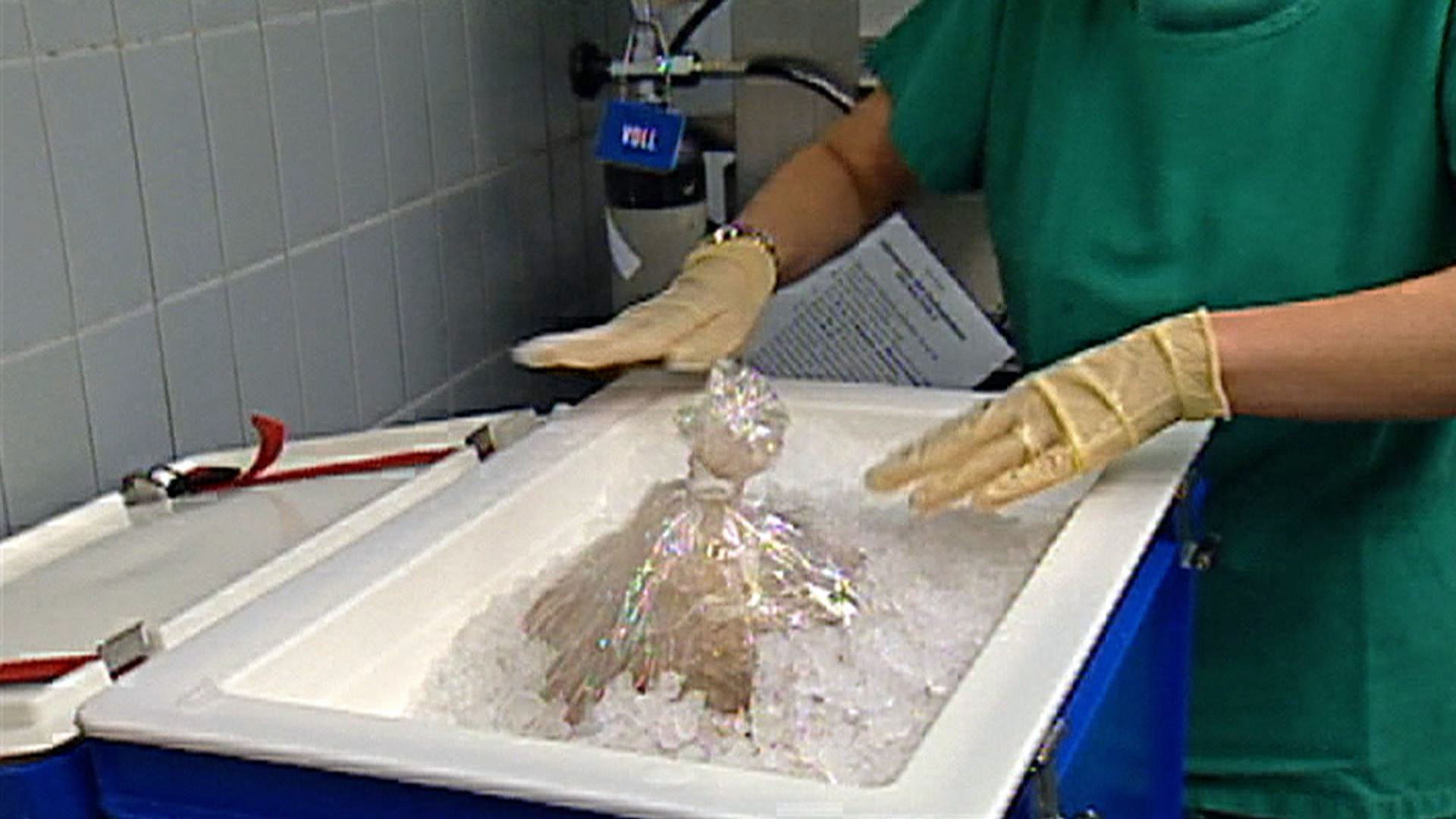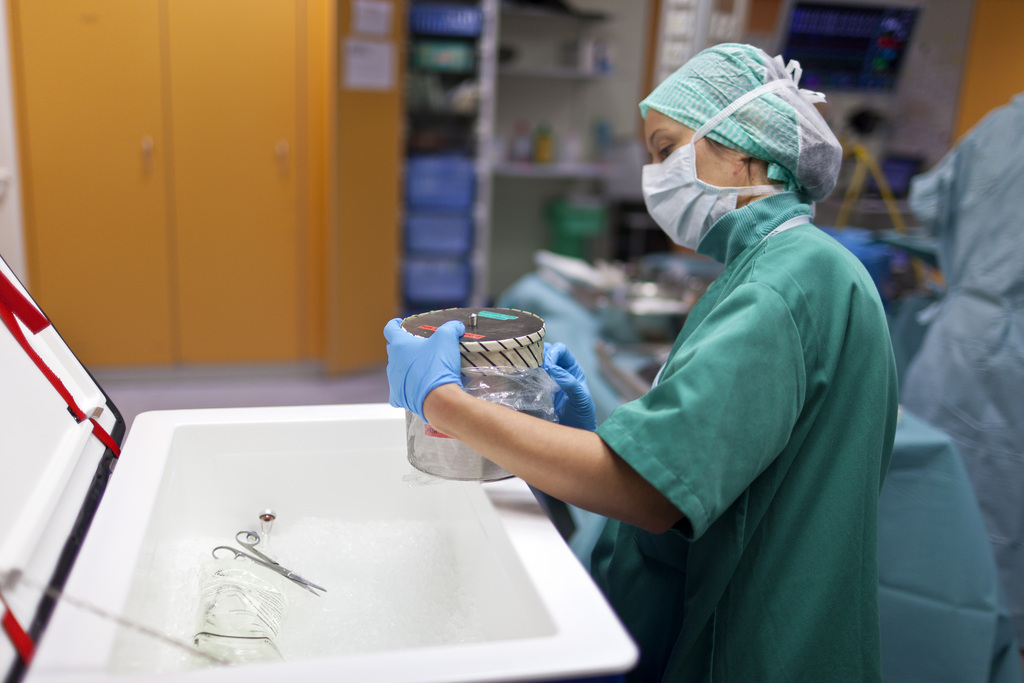“Mommy, it’s Zurich! They have a heart for you!”

Anne Riz was born with a heart defect. Much of her early life was spent in the hospital and as she grew older, her health worsened. Then she received a new heart. She tells swissinfo.ch about life before and after a transplant.
Heart transplantation was in its infancy when Anne was a child in the 1960s, and diagnostic procedures that are standard today – such as echocardiography and sonograms – didn’t exist.
In 1995, four years after the Swiss-American moved to Bern, she developed a problem with the rate and rhythm of her heart, and her extremities increasingly turned blue from lack of oxygen. She was referred to the Zurich University Hospital but doctors there thought it was too early for a transplant.
Her health continued to deteriorate and in November 2002 the hospital suggested that they put her name on the Swisstransplant list of people waiting for organs. She expected to wait a year or more, as is normally the case. Five weeks later there was a heart for her.
That year, 64 people needed hearts but only half received them. Now aged 54, Anne considers herself “extremely lucky”.

More
Transplant rates vary from region to region
swissinfo.ch: December 2012 was the ten year anniversary of your heart transplant. Does it seem like it was ages ago, or just around the corner?
Anne Riz: Strangely enough, both. It seems like it was ages ago most of the time, but I have to go once every six months for a biopsy, and when I’m there I feel like I’ve never left.
swissinfo.ch: What kind of symptoms did you have before the operation?
A. R.: I would get out of breath going up two or three steps. And my lips were blue. People used to say, ‘Oh, have you been eating grape lollypops?’ And for a while in the 80s purple makeup was really big, and people just assumed I was made up all the time.
swissinfo.ch: What happened before you went on the list of people needing organs?
A. R.: I had a thinking process. And you have to go through a series of tests. They check your teeth to make sure you don’t have any cavities or periodontitis. Nothing that could cause an infection. They send you to a dermatologist and check that you don’t have any melanomas. You go to a gynecologist for a pap smear. They check your blood for any kind of unusual antibodies or viruses. And they also send you to a psychologist, who is concerned with your attitude, and particularly with your ability to comply with the regime you have to follow afterwards.
The Swiss Organ Allocation System considers three criteria: urgency, medical factors, and time on the waiting list. Urgent patients have absolute priority.
Some hospital personnel are unhappy with how patients are selected, however, particularly in the case of liver transplantations. “We know that about 20 per cent of the liver recipients on the waiting list have a history of alcohol [abuse] or liver cirrhosis,” Swisstransplant director Franz Immer told swissinfo.ch.
“We sometimes have feedback that despite the fact that recipients with alcoholic liver disease should refrain from alcohol for at least six months before they can be put on the list, that they arrive with alcohol at the time of transplantation, which has a very bad impact on the attitude of the hospital staff.”
swissinfo.ch: But the final decision was up to you?
A. R.: It wasn’t easy, for a number of reasons, but I had a daughter who was only seven or eight, and I wanted to be there for her, and for my family in general.
swissinfo.ch: What were you doing when you were notified that there was an organ for you?
A. R.: It was the shock of my life. When you go on the list they tell you that you have to prepare an overnight bag, and they give you a beeper. But I was at home. I was in the basement doing laundry, and I came up on the elevator with a basket of laundry and my daughter said, “Mommy! Telephone. It’s for you. It’s Zurich! They have a heart!” And I said: “Elena, don’t make jokes about something like that. It’s not funny.” She handed me the phone. And the people from Swisstransplant told me later that they were trying really hard not to laugh.
They said, “You have 30 minutes.” They sent an ambulance to my house to pick me up. The ambulance took me to Zurich with the blue light on, because you only have a certain amount of time, once the donor heart has been harvested. And the ambulance driver got lost. Finally he got a policeman to give him an escort.
I do remember that my husband made it to Zurich before I had to go into the operating room. Mostly it went by in a blur.
swissinfo.ch: What was the hospital stay like afterward?
A. R.: The first few days I was in intensive care. People had to wear slippers and gowns and hats and gloves. And then after that when they came into my regular room they just had to wear facemasks. By the middle of the second week they’d gotten a stationary bike in my room, and had me walking the halls for exercise.
There’s quite a regime to follow. Mouth rinses four or five times a day. And you have 20 different medicines to take at different times of the day. That was what I had to do in my stay in the hospital –learn which medicines to take at what time.
swissinfo.ch: Did they tell you who your heart came from?
A. R.: They don’t tell you, and I think that’s a good thing. My donor could have been a man or a woman. I know what hospital the heart came from.
And from comments about winter being a good season for transplants I think that unfortunately it was probably someone who was in an accident. But it was someone who was probably fairly young and very healthy.
They don’t tell you where you are on the list. They have different priorities. But I was surprised it was only five weeks. That’s practically unheard of. They kept saying, “You have such a good match!”
I haven’t ever had a problem with rejection [of the heart], and it’s normal that you do in the first few months, or the first year, or even the first couple of years. I’ve been incredibly lucky. Incredibly.
swissinfo.ch: What has been the biggest change in your life since the transplant?
A. R.: After the five weeks in the hospital I had to go for a couple of weeks of rehabilitation. It was in the winter in Graubünden. The first day they made everybody go hiking. In the snow – it was snowing. With crampons on. We came around the corner and there was a hill and I said: “Oh, I hate hiking.” And I started walking up the hill, and I didn’t lose my breath. For the first time in my life.

In compliance with the JTI standards
More: SWI swissinfo.ch certified by the Journalism Trust Initiative










You can find an overview of ongoing debates with our journalists here . Please join us!
If you want to start a conversation about a topic raised in this article or want to report factual errors, email us at english@swissinfo.ch.